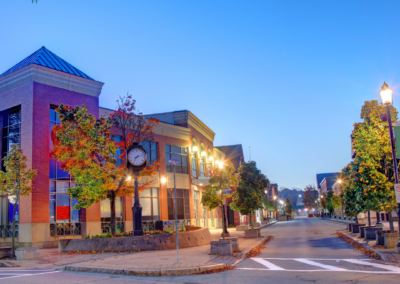Salisbury, New Brunswick – Adjusting to new borders, exploring new sustainability frontiers
Excitement, but mixed with a bit of trepidation. That’s probably a good way to describe how Austin Henderson and Katy Doucette feel as they begin the process of developing Salisbury’s first-ever Community Energy and Emissions Plan, or CEEP. The youthful pair – Chief Administrative Officer and Coordinator of Events and Strategic Projects respectively for the town – have been tasked with leading the project. New Brunswick’s Climate Change Action Plan requires that all communities have a CEEP by 2030, and Salisbury is just getting ramped up.
Their work has been made more complicated by the fact that Salisbury underwent major changes when NB’s local governments were realigned in 2023.
“On January 1, we went from a village of 2300 residents to a town of 7800,” explains Henderson. “Overnight, our area expanded from 14 square kilometers to 329, as parts of four former Local Service Districts became part of Salisbury.”
Municipal reform can be very disruptive, but the impacts of Salisbury’s restructuring were cushioned by two realities. First, the new boundaries were similar to existing school boundaries, so there was already some degree of communal spirit. Second, none of the four Local Service Districts that became part of the new community were incorporated, making the process of reconciling or revising by-laws, building codes or other administrative procedures much less complicated than it could have been.
Still, the restructuring meant that a lot of municipal priorities had to be put on hold as Salisbury adjusted to its new reality and envisioned its future.
“The former village was pretty understaffed. There were only a few positions, and even some of those were vacant,” reflects Henderson. “We’re now revamping our organizational structure so it’s more in line with the needs of our new community.”
One result of that revamping has been the hiring of Doucette to lead the development of Salisbury’s CEEP.
“It’s an exciting process,” she shares – but also acknowledges that it’s a significant challenge. “It’s something that’s totally new to us, so there’s a lot to discover, a lot to learn.”
Both Doucette and Henderson are looking forward to taking part in QUEST’s Net-zero Communities Accelerator Program.
“We appreciate the knowledge and guidance we’ve been getting since joining a few months ago,” says Doucette. “And our recent Energy Mapping and CEEP Development Workshops have gotten the ball rolling.”

Plus they’re excited at the prospect of learning about actions, initiatives and approaches being taken by other QUEST communities across New Brunswick and Canada, to help leverage their limited resources.
“When it comes to undertaking a project like this, most small municipalities like ours would have the same pain points as we do,” adds Henderson. “So let’s learn from each other.”
Salisbury is just starting its CEEP process, but Henderson and Doucette believe the community’s citizens have a good foundational commitment to sustainability.
“We’re an agricultural community, so there’s a long tradition of relying on the land,” says Henderson. “And there’s a lot of community pride in our Farmer’s Market – formerly a dilapidated old barn, but today transformed into a beautiful building complete with solar panels.” The decades-long debate over the former causeway that crossed the Petitcodiac River just downstream from Salisbury has also heightened resident awareness of environmental issues.
But perhaps the best example of how sustainable thinking is taking root in the community is Salisbury’s planned new fire hall. It was first proposed back in 2019, but the project was paused pending the outcome of the municipal realignments that were already in process.
“That delay was probably a blessing in disguise,” says Henderson. “Had we built back then, we probably would have gone with a basic wood-framed structure, with not a lot of regard to energy efficiency or long-term operating costs.”
But fast forward to 2023, when the fire hall project was revived, and the initiative took on a whole different vibe and approach.
“Our current vision is that the new fire hall will be ‘net-zero ready’,” says Henderson, “and hopefully fully net-zero soon after.”
That ambitious goal will be achieved through energy-efficient construction, such as the use of insulated concrete form walls instead of conventional wood framing; and energy efficient equipment, such as a geothermal system for heating and hot water that is expected to reduce costs by $30,000 per year. As well, the building will be pre-wired for easy addition of solar panels – something Henderson hopes will happen soon after construction is completed.
The feasibility study for the project was supported by the Green Municipal Fund, which is administered by the Federation of Canadian Municipalities and funded by the federal government. The town is now pursuing further support from the Green Municipal Fund for the construction phase.
“Fingers crossed,” Henderson smiles, “but if everything goes according to plan, sometime in 2025 we’ll have a brand-new fire hall that generates as much energy as it uses.”
He and Doucette hope that, by demonstrating that sustainability and savings go hand in hand, the new fire hall will serve as an inspiration to the community, and lead to efficiency being integrated into other community infrastructure projects, such as potential upgrades to municipal buildings and the town’s wastewater treatment facilities.
Salisbury is early into its CEEP development journey, but Henderson and Doucette are up to the task. They know that success will come not only by creating a comprehensive CEEP for their community, but also by ensuring that it takes root and becomes part of the community’s culture.
“It’s our job to ingrain sustainability into everyday operations; to embed it so it’s second nature,” concludes Henderson. “And there are tons of options and opportunities to do that – from by-laws to building codes to job descriptions.”
“We’ve taken the first steps,” adds Doucette, noting that the community’s asset management plan has been updated, and climate risk was factored in for the first time. Initial steps have also been taken to measure corporate emissions (IE those under the direct control of the municipality). “Now we need to focus on working through the process.”
2024 marks 250 years since the first Europeans settled permanently in the Salisbury area. It’s an opportunity to look back on a proud history – and to look forward to a sustainable future!
ABOUT THE AUTHOR

Carl Duivenvoorden
Speaker, writer and sustainability consultant Carl Duivenvoorden helps people and organizations learn how they can save money, energy and our environment. He’s presented to over 450 audiences across Atlantic Canada and in the US, and his column Green Ideas ran for 10 years in New Brunswick dailies. He lives in Upper Kingsclear, NB.

About Powered by Communities
Established in 2017, Powered by Communities is an awareness-raising, communications and media platform that highlights and celebrates local community energy initiatives taking place across the country, from coast to coast to coast. The platform inspires, informs and engages its readership with stories and articles detailing community energy initiatives being led by local governments, municipalities, Indigenous communities, community groups, non-profits, charities, and enterprising individuals.

About QUEST Canada
QUEST Canada is a registered Canadian charity that supports communities in Canada on their pathway to net-zero. Since 2007, we’ve been facilitating connections, empowering community champions and advising decision-makers to implement efficient and integrated energy systems that best meet community needs and maximize local opportunities. We develop tools and resources, convene stakeholders and rights holders, and advise decision-makers — all with the goal of encouraging, assisting and enabling communities to contribute to Canada’s net-zero goals.

Support local communities by sharing this story
MORE FROM POWERED BY COMMUNITIES
Sign Up
Join the Conversation!
Sign up to get the latest news and updates about QUEST Canada events and receive QUEST Canada's monthly newsletter.




